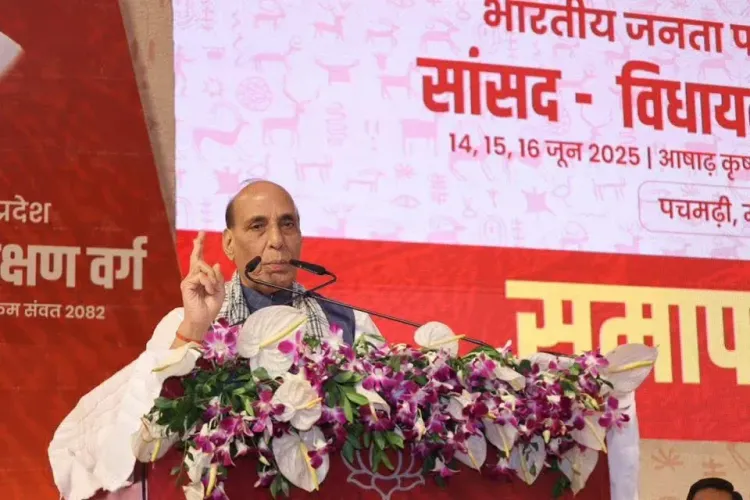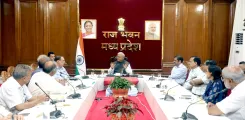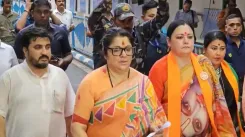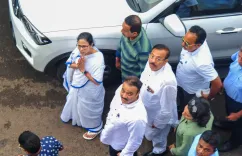Is Operation Sindoor a Justified Response to Terrorism?

Synopsis
Key Takeaways
- Operation Sindoor is a strategic response to terrorism.
- Leadership in a democracy requires humility.
- Public service should be driven by integrity.
- Historical leaders serve as a model for current politicians.
- Training camps enhance ideological understanding.
Pachmarhi (Madhya Pradesh), June 16 (NationPress) Defence Minister Rajnath Singh, while speaking at the BJP’s three-day training camp in Pachmarhi, Madhya Pradesh, invoked the sentiment of “Jinh mohi mara, te mai maare…” (I struck those who struck me) from the Ramcharitmanas, reflecting on the essence behind India’s recent Operation Sindoor.
This statement came in the wake of the tragic Pahalgam terror attack, which resulted in the deaths of 26 civilians, including a Nepali national, due to assaults from Pakistan-backed militants.
Operation Sindoor, initiated on May 7, served as India's calculated yet decisive response, targeting nine terror hubs associated with Lashkar-e-Taiba, Jaish-e-Mohammed, and Hizbul Mujahideen across Pakistan and Pakistan-occupied Kashmir.
Singh characterized this operation as a measured approach driven by justice rather than provocation. Addressing over 200 BJP MPs and MLAs at the training camp located in the colonial-era hill station of Pachmarhi, he delivered an impactful message regarding leadership, ethics, and the duty to serve the public.
He cautioned party leaders that authority in a democracy is transient and should be exercised with humility. Today’s mandate might belong to one leader, but it could easily change tomorrow. “Hence, arrogance should be shunned, and public service practiced with integrity and accountability,” the Defence Minister emphasized. Singh also took this opportunity to remind attendees of the Bharatiya Janata Party’s disciplined journey from its roots in Jan Sangh.
By referencing figures like Atal Bihari Vajpayee, Deendayal Upadhyay, and Shyama Prasad Mukherjee, he illustrated a political life focused on values, restraint, and commitment to national service. Rajnath Singh’s guidance showcased not just his role as Defence Minister but also his prominence as a former national president of the BJP.
The training camp, which took place from June 14 to 16, was inaugurated by Union Home Minister Amit Shah and comprised 201 BJP representatives. The agenda included sessions aimed at deepening ideological comprehension and enhancing leadership ethics, with discussions tailored for both novice MLAs and seasoned legislators. Participants were categorized based on their experience—from first-term MLAs to those serving their third or ninth term—to promote peer learning and collective reflection.
Many attendees expressed appreciation for the impact of the sessions. At the conclusion of the camp, Madhya Pradesh BJP President VD Sharma confirmed that the training represented a serious commitment to prepare lawmakers for principled public life. Although senior BJP leader Jyotiraditya Scindia and 15 MLAs were unable to participate, the overall turnout and the depth of discussions were viewed as strong indicators of internal unity and readiness.





